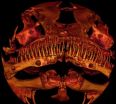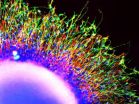(Press-News.org) May 13, 2014 – (BRONX, NY) – Healthy stem cells work to restore or repair the body's tissues, but cancer stem cells have a more nefarious mission: to spawn malignant tumors. Cancer stem cells were discovered a decade ago, but their origins and identity remain largely unknown.
Today, the Ruth L. and David S. Gottesman Institute for Stem Cell and Regenerative Medicine Research at Albert Einstein College of Medicine of Yeshiva University hosted its second Stem Cell Symposium, focusing on cancer stem cells. Leading scientists from the U.S., Canada and Belgium discussed the latest advances in the field and highlighted the challenges of translating this knowledge into targeted cancer treatments.
"These exceptional scientists are pioneers in the field and have made enormous contributions to our understanding of the biology of stem cells and cancer," said Paul Frenette, M.D., director and chair of Einstein's Stem Cell Institute and professor of medicine and of cell biology. "Hopefully this symposium will spark productive dialogues and collaborations among the researchers who attend."
The presenters were:
"Cancer Stem Cells and Malignant Progression," Robert A. Weinberg, Ph.D., Daniel K. Daniel K. Ludwig Professor for Cancer Research Director, Ludwig Center of the Massachusetts Institute of Technology; Member, Whitehead Institute for Biomedical Research
"Towards Unification of Cancer Stem Cell and Clonal Evolution Models of Intratumoral Heterogeneity," John Dick, Ph.D., Canada Research Chair in Stem Cell Biology and senior scientist, Princess Margaret Cancer Center, University Health Network; professor of molecular genetics, University of Toronto
"Normal and Neoplastic Stem Cells," Irving L. Weissman, M.D., Director, Institute for Stem Cell Biology and Regenerative Medicine and Director, Stanford Ludwig Center for Cancer Stem Cell Research and Medicine; Professor of Pathology and Developmental Biology, Stanford University School of Medicine
"Cell Fate Decisions During Tumor Formation," Leonard I. Zon, M.D., Grousbeck Professor of Pediatric Medicine, Director, Stem Cell Research Program, Howard Hughes Medical Institute/Boston Children's Hospital, Harvard Medical School
"Skin Stem Cells in Silence, Action and Cancer," Elaine Fuchs, Ph.D., Rebecca C. Lancefield Professor, Laboratory of Mammalian Cell Biology and Development, Howard Hughes Medical Institute/The Rockefeller University
"Mechanism Regulating Stemness in Skin Cancer," Cédric Blanpain, M.D., Ph.D., professor of stem cell and developmental biology, WELBIO, Interdisciplinary Research Institute, Université Libre de Bruxelles
"Mouse Models of Malignant GBM: Cancer Stem Cells and Beyond," Luis F. Parada, Ph.D., professor and chairman, Diana K and Richard C. Strauss Distinguished Chair in Developmental Biology; Director, Kent Waldrep Foundation Center for Basic Neuroscience Research; Southwestern Ball Distinguished Chair in Nerve Regeneration Research, University of Texas Southwestern Medical Center
INFORMATION:
About Albert Einstein College of Medicine of Yeshiva University
Albert Einstein College of Medicine of Yeshiva University is one of the nation's premier centers for research, medical education and clinical investigation. During the 2013-2014 academic year, Einstein is home to 734 M.D. students, 236 Ph.D. students, 106 students in the combined M.D./Ph.D. program, and 353 postdoctoral research fellows. The College of Medicine has more than 2,000 full-time faculty members located on the main campus and at its clinical affiliates. In 2013, Einstein received more than $155 million in awards from the NIH. This includes the funding of major research centers at Einstein in diabetes, cancer, liver disease, and AIDS. Other areas where the College of Medicine is concentrating its efforts include developmental brain research, neuroscience, cardiac disease, and initiatives to reduce and eliminate ethnic and racial health disparities. Its partnership with Montefiore Medical Center, the University Hospital and academic medical center for Einstein, advances clinical and translational research to accelerate the pace at which new discoveries become the treatments and therapies that benefit patients. Through its extensive affiliation network involving Montefiore, Jacobi Medical Center -Einstein's founding hospital, and five other hospital systems in the Bronx, Manhattan, Long Island and Brooklyn, Einstein runs one of the largest residency and fellowship training programs in the medical and dental professions in the United States. For more information, please visit www.einstein.yu.edu, read our blog, follow us on Twitter, like us on Facebook, and view us on YouTube. END
Cancer stem cells under the microscope at Albert Einstein College of Medicine symposium
2014-05-13
ELSE PRESS RELEASES FROM THIS DATE:
Algorithm enables computers to identify actions much more efficiently
2014-05-13
With the commodification of digital cameras, digital video has become so easy to produce that human beings can have trouble keeping up with it. Among the tools that computer scientists are developing to make the profusion of video more useful are algorithms for activity recognition — or determining what the people on camera are doing when.
At the Conference on Computer Vision and Pattern Recognition in June, Hamed Pirsiavash, a postdoc at MIT, and his former thesis advisor, Deva Ramanan of the University of California at Irvine, will present a new activity-recognition ...
Mayo Clinic study identifies strategies that reduce early hospital readmissions
2014-05-13
ROCHESTER, Minn. — May 13, 2014 — A Mayo Clinic review of 47 studies found that 30-day readmissions can be reduced by almost 20 percent when specific efforts are taken to prevent them. Key among these are interventions to help patients deal with the work passed on to them at discharge. The results of the review are published in this week's issue of JAMA Internal Medicine.
"Reducing early hospital readmissions is a policy priority aimed at improving quality of care and lowering costs," says Aaron Leppin, M.D., a research associate in Mayo Clinic's Knowledge and Evaluation ...
Novel protein fragments may protect against Alzheimer's
2014-05-13
The devastating loss of memory and consciousness in Alzheimer's disease is caused by plaque accumulations and tangles in neurons, which kill brain cells. Alzheimer's research has centered on trying to understand the pathology as well as the potential protective or regenerative properties of brain cells as an avenue for treating the widespread disease.
Now Prof. Illana Gozes, the incumbent of the Lily and Avraham Gildor Chair for the Investigation of Growth Factors and director of the Adams Super Center for Brain Studies at the Sackler Faculty of Medicine and a member ...
A tiny, toothy catfish with bulldog snout defies classification
2014-05-13
PHILADELPHIA (May 13, 2014)— Kryptoglanis shajii is a strange fish – and the closer scientists look, the stranger it gets. This small subterranean catfish sees the light of day and human observers only rarely, when it turns up in springs, wells and flooded rice paddies in the Western Ghats mountain region of Kerala, India. It was first described as a new species in 2011.
Soon after that, John Lundberg, PhD, one of the world's leading authorities on catfishes, started taking a closer look at several specimens.
"The more we looked at the skeleton, the stranger it got," ...
UTMB study discovers cause of many preterm births
2014-05-13
A new study by researchers at the University of Texas Medical Branch at Galveston is the first to show that premature aging of the placenta due to oxidative stress is the cause of many preterm births. The study appears today in the American Journal of Pathology.
Researchers took fetal membranes, exposed them to oxidative stress in a lab setting (specifically cigarette smoke extract) and examined whether it caused rapid aging of the placental tissue. It did.
Oxidative stress factors include environmental toxins and pollution and are an inevitable component of normal ...
TB lung infection causes changes in the diversity of gut bacteria in mice
2014-05-13
Johns Hopkins researchers have found evidence in mice that a tuberculosis (TB) infection in the lungs triggers immune system signaling to the gut that temporarily decreases the diversity of bacteria in that part of the digestive tract.
The Johns Hopkins researchers showed that this decrease in diversity of gut bacteria as measured in fecal samples happened quickly — within six days after mice were exposed to an aerosol mixture of M. tuberculosis, the TB bacteria. This prompt shift in diversity, they say, suggests that the immune system is attacking the gut bacteria, decreasing ...
Get it over with: People choose more difficult tasks to get jobs done more quickly
2014-05-13
Putting off tasks until later, or procrastination, is a common phenomenon – but new research suggests that "pre-crastination," hurrying to complete a task as soon as possible, may also be common.
The research, published in Psychological Science, a journal of the Association for Psychological Science, suggests that people often opt to begin a task as soon as possible just to get it off their plate, even if they have to expend more physical effort to do so.
"Most of us feel stressed about all the things we need to do – we have to-do lists, not just on slips of paper ...
Coral reefs are critical for risk reduction & adaptation
2014-05-13
ARLINGTON, Va — Stronger storms, rising seas, and flooding are placing hundreds of millions people at risk around the world, and big part of the solution to decrease those risks is just off shore. A new study finds that coral reefs reduce the wave energy that would otherwise impact coastlines by 97 percent.
"Coral reefs serve as an effective first line of defense to incoming waves, storms and rising seas," said Dr. Michael Beck, lead marine scientist of The Nature Conservancy and a co-author of the study, "200 million people across more than 80 nations are at risk if ...
New stem cell research points to early indicators of schizophrenia
2014-05-13
LA JOLLA—Using new stem cell technology, scientists at the Salk Institute have shown that neurons generated from the skin cells of people with schizophrenia behave strangely in early developmental stages, providing a hint as to ways to detect and potentially treat the disease early.
The findings of the study, published online in April's Molecular Psychiatry, support the theory that the neurological dysfunction that eventually causes schizophrenia may begin in the brains of babies still in the womb.
"This study aims to investigate the earliest detectable changes in the ...
Preschool teacher depression linked to behavioral problems in children
2014-05-13
COLUMBUS, Ohio – Depression in preschool teachers is associated with behavioral problems ranging from aggression to sadness in children under the teachers' care, new research suggests.
The study identified one contributing factor to this link: a poor-quality atmosphere in the child care setting that exists as a result of the teacher's depressive symptoms. In this study, "teacher" refers to both classroom instructors and in-home child care providers.
Researchers conducted the study using data from a large national study that collected family information primarily from ...

